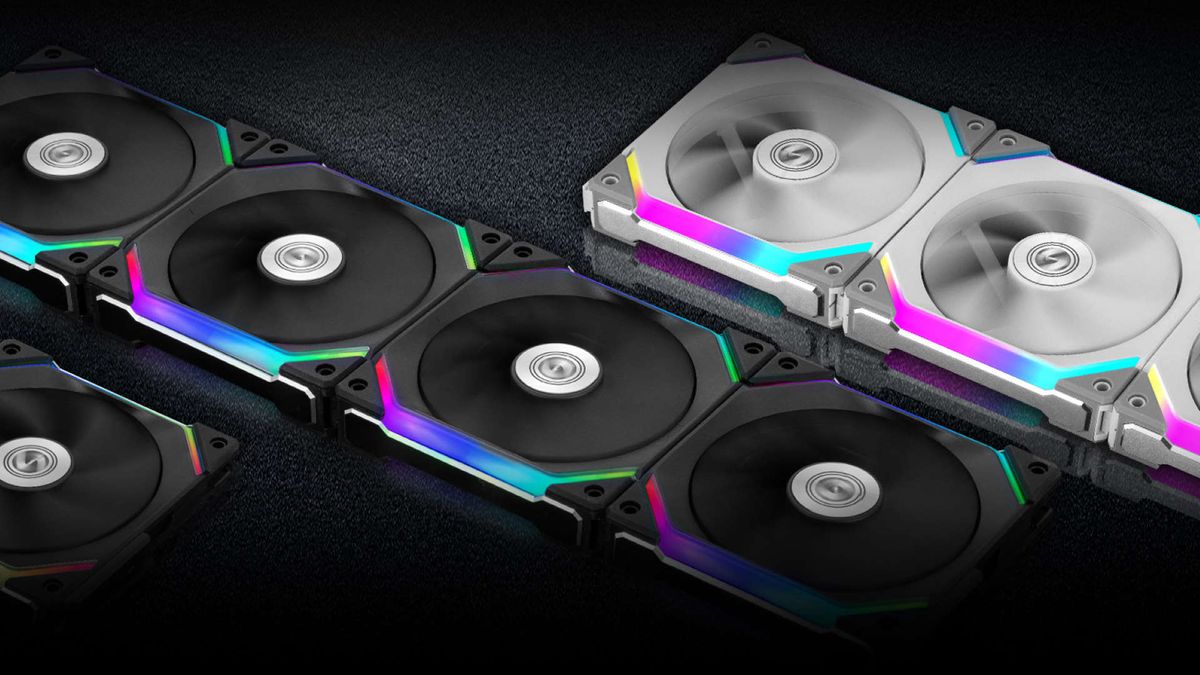Our Verdict
Lian LI's new fan technology offers a smart new way to fill your gaming PC with beautiful-looking fans, without the excess wiring. Though its benefits only become clear the more you add.
For
- Simple to use
- Smart design
- 16 fans with one controller
- Potentially fewer cables...
Against
- ...but potentially more cables
PC Gamer's got your back
The new Lian Li UNI FAN SL120 brings the potential for clutter-free cooling to your PC building fun times. Offering an inter-locking, modular design, the new system allows you to connect up to four individual fans together to create a slab of RGB-laden beauty that needs only a solitary cable to make them spin and shine. It's a solution that will make the mess of cabling inside a modern PC far more manageable… well, so long as you're intent on putting a lot of fans in your machine.
Fan dimension - 122.8 x 122.4 x 25mm
Fan speed - 800 - 1,900RPM
Noise - 17 ~ 31dB
Bearings - Fluid dynamic bearing
Max. air pressure - 2.54mmH20
Max. air flow - 58.54CFM
Sorry, what? Case fan innovation? Is this some kind of voodoo magic? Aside from fitting some pretty lights around the spinning blades, which help keep our precious PC components chilled, PC manufacturers haven't really done a lot to change the humble case fan. Okay, there have been small updates to blade design, promising to increase airflow and such, as well as advances in bearing tech—magnetic levitation, FTW—but Lian Li's nifty new tech is the first to be genuinely, and moreover tangibly useful to almost anyone building a DIY gaming PC.
Lian Li's smart daisy-chain setup is robust, simple, and incredibly effective. So is the slick addressable RGB lighting, but that's really only some lovely cosmetic frosting on top of the innovative new fan design. The individual fans slot together easily, with pin-to-pin contacts between them to transfer power and lighting data, and that makes for a super snug fit. You then slot in a cable to one end of the group to run all three, or up to four if you buy another single fan.
Lian Li has listed the retail pricing as $80 for a pack of three, which includes the controller, and $25 for a single fan, which doesn't.
Since squeezing a Comet Lake system inside the Lian Li DK-04F, I've been looking for a way to cut down on the frightening array of wiring inside this system. This chassis-desk is full of fans; on the CPU cooler, the rear exhaust, and with a bank of them pulling cool air in from the front. Most motherboards would need a separate fan controller to pull together all the power cables.
With a three-pack of the Lian Li UNI FAN SL120 slotted together at the front there's just a single cable trailing from the lot of them. If that single cable was just going into a 4-pin connector on my motherboard then I'd be a very happy man indeed. No cables, no problems, right?

Except that isn't quite how the UNI FAN SL120 system works. With the three-pack you do get a dedicated fan controller, and the single cable from the grouped fans plugs into that. You can actually connect up to four of the fans together and they'll only need one wire for the controller. The controller itself will take four inputs, so you can have up to 16 fans, in four groups, going into the same block.
And if you are going for an extreme volume of fans then the UNI FAN SL120 system will make your system super-tidy, reducing the number of wires floating around inside your chassis. Aficionados of the minimalist aesthetic will love that. Though if you're only opting for a single block of fans those aesthetes may not be so bowled over.
While you only need a single cable coming from the block of three or four fans when they're connected together, it doesn't go directly into your motherboard, it has to plug into the UNI FAN controller first. That then has another three separate cables spilling out of it: one for USB, another for SATA power, and a final one to carry all that sweet, sweet ARGB love from your motherboard.
There are 32 addressable RGB LEDs in arrayed around each fan—16 along the top and 16 along the bottom of the frame—and that can make for some supremely shiny effects. The UNI FAN SL120 system can be picked up in either black or white, to help match the look, or desired look, of your machine.




The fans themselves are high-static pressure fans, so they're suitable to attach to a compatible 120mm AIO radiator as well as a PC chassis, with a maximum speed of up to 1,900RPM.
But the fact that the UNI FAN SL120 controller actually creates more cabling for a single block is a little troubling. Foolishly I was hoping to lessen the number of wires in my build, but it meant I was left searching for more connectors, and actually had to unplug an old HDD to satisfy Lian Li's SATA power needs.
It does create easier routing of cables around the fans, however, and when you're building a machine from scratch that is incredibly helpful. And, as I alluded to earlier, if you're adding multiple fan arrays to your gaming PC, the UNI FAN system's controller actually will cut down the cabling the more groups you add.
Lian Li's new fan system then is genuinely smart, effective, and looks great. But if you had hopes for a 'one cable to rule them all' setup then you might be a little disappointed. Add a whole lot more fans, and some really funky RGB effects to your machine, though, and that disappointment will soon evaporate.
Lian LI's new fan technology offers a smart new way to fill your gaming PC with beautiful-looking fans, without the excess wiring. Though its benefits only become clear the more you add.

Dave has been gaming since the days of Zaxxon and Lady Bug on the Colecovision, and code books for the Commodore Vic 20 (Death Race 2000!). He built his first gaming PC at the tender age of 16, and finally finished bug-fixing the Cyrix-based system around a year later. When he dropped it out of the window. He first started writing for Official PlayStation Magazine and Xbox World many decades ago, then moved onto PC Format full-time, then PC Gamer, TechRadar, and T3 among others. Now he's back, writing about the nightmarish graphics card market, CPUs with more cores than sense, gaming laptops hotter than the sun, and SSDs more capacious than a Cybertruck.

Dragon Age: The Veilguard's latest update sure sounds like its last

The team behind one of 2024's hidden gems is following it up with a stop-motion 'relaxed digging and discovery' game about a happy robot's underground adventures beneath a lake of slime

I put a $139 gamer muzzle on my loud husband to muffle his Rainbow Six shouting, but the quiet wasn't worth the guilt
